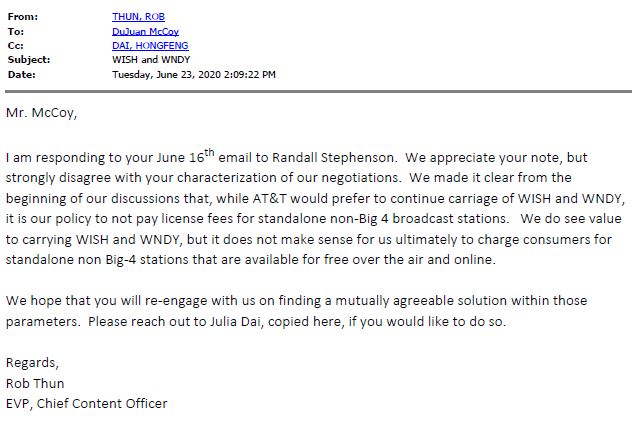At 11:59pm Eastern on Friday, January 31, two Indianapolis TV stations fell dark on DirecTV, as a retransmission consent deal agreed to by the stations’ prior ownership lapsed. No new retrans consent arrangement has yet to come to fruition.
Now, more than six months later, the owner of the stations — DuJuan McCoy — is taking DirecTV owner AT&T to court. And, he says that as an African American, he is a victim of racial discrimination.
DuJuan McCoy is a featured panelist at RBR+TVBR’s forthcoming Black Media Symposium, presented by Triton Digital. For full details on this free, virtual event on August 19 at 11:30am Eastern, please click here.
McCoy participated in a pre-event conversation with Editor-in-Chief Adam R Jacobson ahead of the filing of this lawsuit, and we present the interview on August 12 at RBR.com.
McCoy’s Circle City Broadcasting on Monday evening (8/10) followed through with its filing of a complaint and demand for jury trial against AT&T Corporation, and its DirecTV and U-Verse MVPDs. In the 13-page complaint, McCoy argues that Circle City is a victim of “racial discrimination in contracting by AT&T.”
Specifically, the case addresses “AT&T’s refusal to contract in a non-discriminatory manner
with Circle City as required by 42 U.S.C. § 1981.”
While a racial discrimination claim may raise eyebrows, given DirecTV’s history of retransmission consent impasses (for most of September and October 2019, Cowles-owned stations disappeared from DirecTV lineups as a new retrans agreement couldn’t be met), McCoy bluntly asserts that AT&T is “refusing to negotiate a contract with Circle
City because the stations in question are now owned by a Black man, a Black man who has
made a career out of advancing the cause of Blacks and other minorities in media
ownership and leadership.”
The lawsuit, filed with the U.S. District Court’s Indianapolis division, further claims that AT&T “only deals fairly with historically more established broadcasters (namely, white-owned) when negotiating carriage agreements. It insists on maintaining its decades-long policies and practices of discriminating against the minority broadcaster, the broadcaster that never had the chance to become one of the historically more established broadcasters and thus remains perpetually ineligible to do business with AT&T. The effect has been to exclude minority broadcasters and deny them a seat at the table of American media ownership and management.”
The stations at the heart of the lawsuit are WISH-8, an affiliate of The CW Network that has embraced local news viewers under Circle City ownership, and “MyINDY-TV 23,” WNDY-TV.
In early April 2019, as the NAB Show in Las Vegas unfolded, McCoy earned national attention for striking a $42.5 million deal to enter DMA No. 28 by purchasing the stations from Nexstar Media Group. He closed on the deal Sept. 19, 2019, and immediately put the wheels in motion on securing a new carriage agreement with DirecTV.
On Jan. 31, McCoy commented, “It is my understanding that the previous owner received substantial fees from the satellite providers to rebroadcast these stations.”
In the lawsuit, he asserts, “AT&T has refused to negotiate any retransmission agreement with Circle City, offering it zero for its content.”
McCoy then notes in the lawsuit that he attempted, via a June 16 e-mail to AT&T President/CEO Randall Stephenson, to understand why AT&T “was taking such a hard line against contracting with Circle City.”

Stephenson didn’t reply. Instead, one week later, McCoy received a reply from Robert Thun, AT&T’s EVP/Chief Content Officer. Thun was placed under the national spotlight in October 2019 when he participated in a testy exchange over the Cowles stations’ “blackout” on DirecTV with Sen. Jon Tester during a hearing on STELA reauthorization.
What was stated in that email from Thun to McCoy?
Thun stated that it is AT&T “policy to not pay license fees for standalone non-Big 4 broadcast stations” and further stated “it does not make sense for us ultimately to charge consumers for standalone non
Big-4 stations.”

McCoy sees one fundamental flaw in Thun’s response.
“When Nexstar owned the stations, it did not own other stations in the Indianapolis market, meaning Nexstar’s stations were “standalone non-Big 4 broadcast stations.”
This led McCoy to further assert that racial discrimination was at work.
“Upon information and belief, AT&T maintains an internal playbook designed to suppress minority-based content,” the lawsuit claims. “Further, AT&T officials view Circle City’s
acquisition of its two Indianapolis broadcast stations as “the first of its kind” and AT&T
does not want to “open the floodgates to start paying people like this.”
How much money did Nexstar pocket from the WISH and WNDY retrans agreement with AT&T for DirecTV carriage? Circle City does not have copies or access to AT&T’s retransmission agreements with Nexstar. But, the lawsuit said, the company “can deduce from station financial information to which it does have access that payments were being received prior to Circle City’s acquisition.”
Asked to comment on the lawsuit, McCoy on Tuesday morning (8/11) told RBR+TVBR via e-mail, “As AT&T said, this is a first transaction of its kind in America. For me, when I am the ‘first to do something’ I am not only representing myself and company, I’m representing all of the other voices and people who want to follow in my footsteps!”
By e-mail, an AT&T spokesperson offered a rebuttal to McCoy’s lawsuit.
“These allegations are baseless and we will fight them in court,” the AT&T representative wrote in an e-mailed statement. “This is a straightforward negotiation over retransmission fees. Circle City sued as a negotiating tactic only after we declined its demands for compensation above and beyond what similar independent stations receive.”
Circle City and McCoy are represented by Bruse Loyd, who is licensed to practice in Indiana and is a partner at Houston-based Jones, Gillespa & Loyd; Gregory Hahn, of Indianapolis-based Bose McKinney & Evans; and Pro Hac Vice Pending Fletcher Heald & Hildreth attorney Dan Kirkpatrick.
WISH-8 has been an affiliate of The CW Network since the final days of 2014, when its longtime CBS affiliation shifted to WTTV as part of Tribune Media’s plan to exit broadcast ownership. That plan originally saw a merger with Sinclair Broadcast Group. When that deal imploded due to FCC concerns over flaunting of its ownership rules, Nexstar ended up merging with Tribune. This led to the ultimate divestment of WISH and WNDY, as Nexstar already had two properties in the market through its Media General merger.





